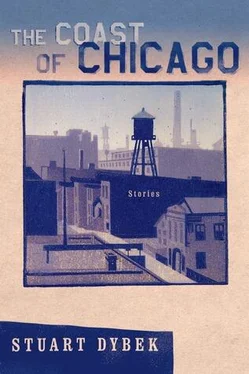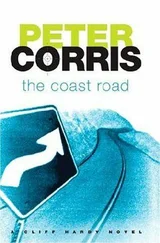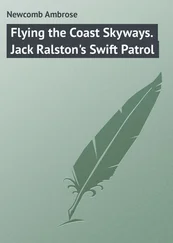“Well, that’s different,” Pepper said. “Then let them call it an Official Fucked-Up Neighborhood.”
Nobody pointed out that you’d never hear a term like that from a public official, at least not in public, and especially not from the office of the mayor who had once promised, “We shall reach new platitudes of success.”
Nor did anyone need to explain that Official Blight was the language of revenue, forms in quintuplicate, grants, and federal aid channeled through the Machine and processed with the help of grafters, skimmers, wheeler-dealers, an army of aldermen, precinct captains, patronage workers, their relatives and friends. No one said it, but instinctively we knew we’d never see a nickel.
Not that we cared. They couldn’t touch us if we didn’t. Besides, we weren’t blamers. Blight was just something that happened, like acne or old age. Maybe declaring it official mattered in that mystical world of property values, but it wasn’t a radical step, like condemning buildings or labeling a place a slum. Slums were on the other side of the viaduct.
Blight, in fact, could be considered a kind of official recognition, a grudging admission that among blocks of factories, railroad tracks, truck docks, industrial dumps, scrapyards, expressways, and the drainage canal, people had managed to wedge in their everyday lives.
Deep down we believed what Pepper had been getting at: blight had nothing to do with ecstasy. They could send in the building inspectors and social workers, the mayor could drive through in his black limo, but they’d never know about the music of viaducts, or churches where saints winked and nodded, or how right next door to me our guitar player, Joey “Deejo” DeCampo, had finally found his title, and inspired by it had begun the Great American Novel, Blight , which opened: “The dawn rises like sick old men playing on the rooftops in their underwear.”
We had him read that to us again and again.
Ecstatic, Deejo rushed home and wrote all night. I could always tell when he was writing. It wasn’t just the wild, dreamy look that overcame him. Deejo wrote to music, usually the 1812 Overture, and since only a narrow gangway between buildings separated his window from mine, when I heard bells and cannon blasts at two in the morning I knew he was creating.
Next morning, bleary-eyed, sucking a pinched Lucky, Deejo read us the second sentence. It ran twenty ballpoint-scribbled loose-leaf pages and had nothing to do with the old men on the rooftops in their underwear. It seemed as though Deejo had launched into a digression before the novel had even begun. His second sentence described an epic battle between a spider and a caterpillar. The battle took place in the gangway between our apartment buildings, and that’s where Deej insisted on reading it to us. The gangway lent his voice an echoey ring. He read with his eyes glued to the page, his free hand gesticulating wildly, pouncing spiderlike, fingers jabbing like a beak tearing into green caterpillar guts, fist opening like a jaw emitting shrieks. His voice rose as the caterpillar reared, howling like a damned soul, its poisonous hairs bristling. Pepper, Ziggy, and I listened, occasionally exchanging looks.
It wasn’t Deejo’s digressing that bothered us. That was how we all told stories. But we could see that Deejo’s inordinate fascination with bugs was surfacing again. Not that he was alone in that, either. Of all our indigenous wildlife — sparrows, pigeons, mice, rats, dogs, cats — it was only bugs that suggested the grotesque richness of nature. A lot of kids had, at one time or another, expressed their wonder by torturing them a little. But Deejo had been obsessed. He’d become diabolically adept as a destroyer, the kind of kid who would observe an ant hole for hours, even bait it with a Holloway bar, before blowing it up with a cherry bomb. Then one day his grandpa Tony said, “Hey, Joey, pretty soon they’re gonna invent little microphones and you’ll be able to hear them screaming.”
He was kidding, but the remark altered Deejo’s entire way of looking at things. The world suddenly became one of an infinite number of infinitesimal voices, and Deejo equated voices with souls. If one only listened, it was possible to hear tiny choirs that hummed at all hours as on a summer night, voices speaking a language of terror and beauty that, for the first time, Deejo understood.
It was that vision that turned him into a poet, and it was really for his poetry, more than his guitar playing, that we’d recruited him for the No Names. None of us could write lyrics, though I’d tried a few take-offs, like the one on Jerry Lee Lewis’s “Great Balls of Fire”:
My BVDs were made of thatch,
You came along and lit the match,
I screamed in pain, my screams grew higher,
Goodness gracious! My balls were on fire!
We were looking for a little more soul, words that would suggest Pepper’s rages, Ziggy’s prophetic dreams. And we might have had that if Deejo could have written a bridge. He’d get in a groove like “Lonely Is the Falling Rain”:
Lonely is the falling rain,
Every drop
Tastes the same,
Lonely is the willow tree,
Green dress draped
Across her knee,
Lonely is the boat at sea…
Deejo could go on listing lonely things for pages, but he’d never arrive at a bridge. His songs refused to circle back on themselves. They’d just go on and were impossible to memorize.
He couldn’t spell, either, which never bothered us but created a real problem when Pepper asked him to write something that Pepper could send to Linda Molina. Deejo came up with “I Dream,” which, after several pages, ended with the lines:
I dream of my arms
Around your waste .
Linda mailed it back to Pepper with those lines circled and in angry slashes of eyebrow pencil the exclamations: !Lechón!!!Estúpido!!!Pervert!
Pepper kept it folded in his wallet like a love letter.
But back to Blight .
We stood in the gangway listening to Deejo read. His seemingly nonstop sentence was reaching a climax. Just when the spider and caterpillar realized their battle was futile, that neither could win, a sparrow swooped down and gobbled them both up.
It was a parable. Who knows how many insect lives had been sacrificed in order for Deejo to have finally arrived at that moral?
We hung our heads and muttered, “Yeah, great stuff, Deej, that was good, man, no shit, keep it up, be a best-seller.”
He folded his loose-leaf papers, stuffed them into his back pocket, and walked away without saying anything.
Later, whenever someone would bring up his novel, Blight , and its great opening line, Deejo would always say, “Yeah, and it’s been all downhill from there.”
As long as it didn’t look as if Deejo would be using his title in the near future, we decided to appropriate it for the band. We considered several variations — Boys from Blight, Blights Out, the Blight Brigade. We wanted to call ourselves Pepper and the Blighters, but Pepper said no way, so we settled on just plain Blighters. That had a lot better ring to it than calling ourselves the No Names. We had liked being the No Names at first, but it had started to seem like an advertisement for an identity crisis. The No Names sounded too much like one of the tavern-sponsored softball teams the guys back from Korea had formed. Those guys had been our heroes when we were little kids. They had seemed like legends to us as they gunned around the block on Indians and Harleys while we walked home from grade school. Now they hung out at corner taverns, working on beer bellies, and played softball a couple of nights a week on teams that lacked both uniforms and names. Some of their teams had jerseys with the name of the bar that sponsored them across the back, but the bars themselves were mainly named after beers — the Fox Head 400 on Twenty-fifth Street, or the Edelweiss Tap on Twenty-sixth, or down from that the Carta Blanca. Sometimes, in the evenings, we’d walk over to Lawndale Park and watch one of the tavern teams play softball under the lights. Invariably some team calling itself the Damon Demons or the Latin Cobras, decked out in gold-and-black uniforms, would beat their butts.
Читать дальше












